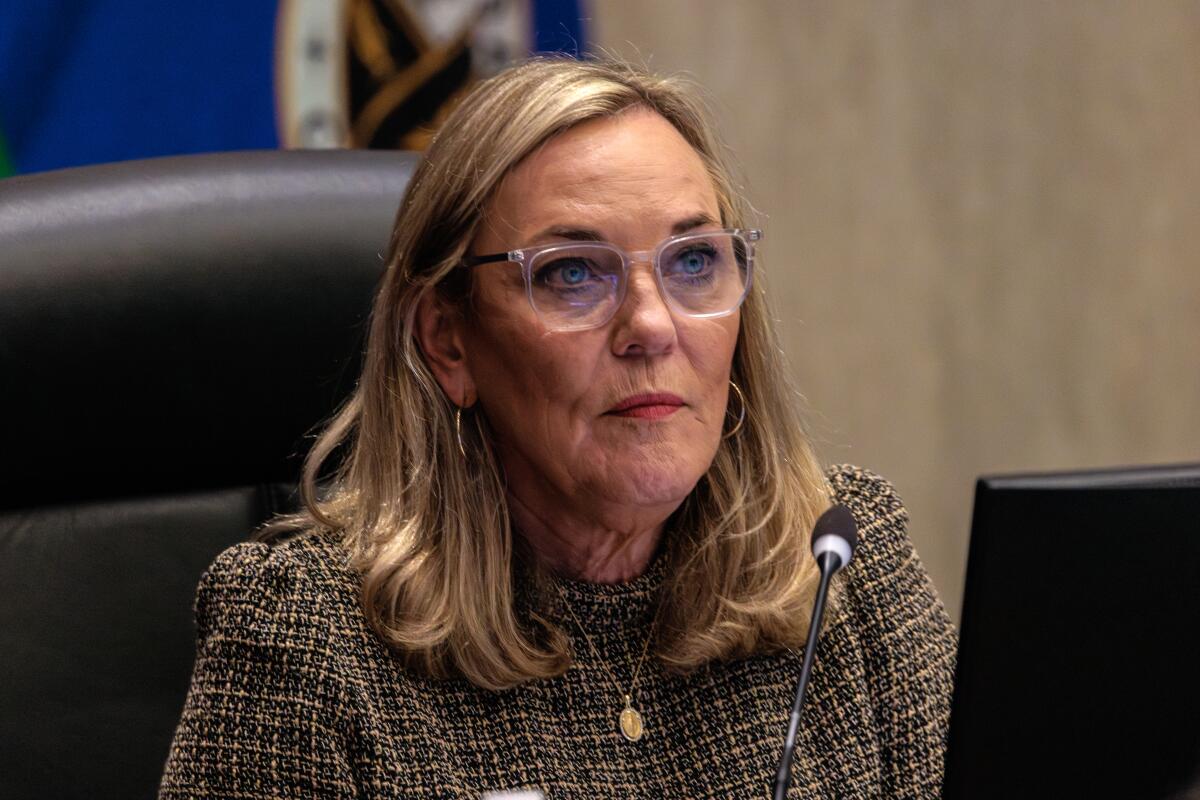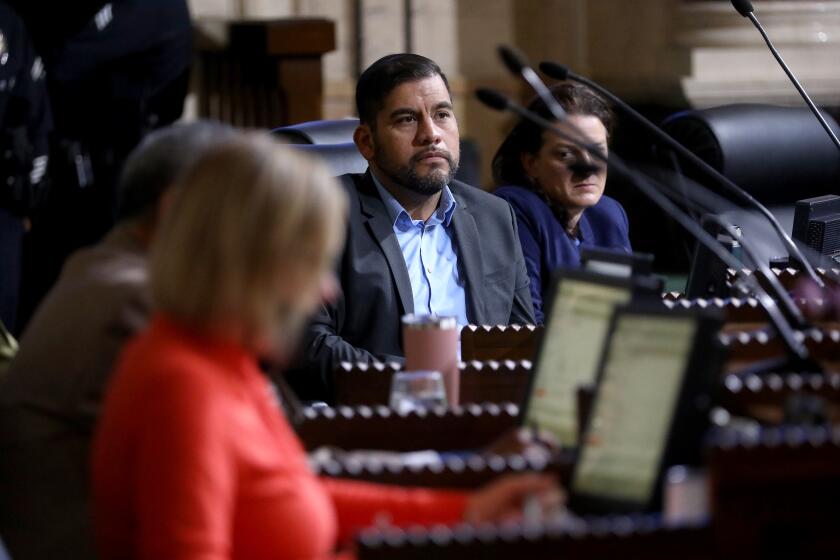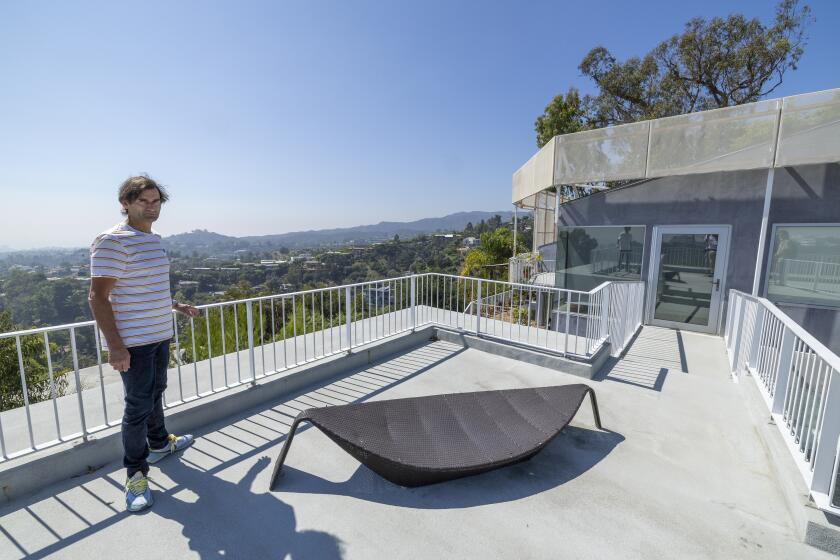L.A. County supervisors approve 4% cap on rent increases through June

- Share via
Los Angeles County supervisors voted Tuesday to extend — and slightly increase to 4% — a soon-to-expire cap on rent increases, sparing tenants in unincorporated areas from a big rent hike for an additional six months.
In November 2022, the supervisors approved a temporary 3% cap on annual rent increases, framing it as a short-term way to keep rent-burdened residents in their homes as the pandemic-era tenant protections dissipated. The cap applies to all rent-controlled units in unincorporated L.A. County — that means those units built before 1995, as well as all mobile homes.
The cap was meant to expire at the end of this year, at which point landlords could have hiked rents by up to 8%.
But on Tuesday, the supervisors voted 4 to 1 to approve the 4% cap and keep it in place through June.
The board also voted unanimously to direct relevant county departments to look into what a permanent cap should look like for unincorporated areas.
Plus, a council candidate arrested on suspected DUI, robotaxi regulation and more.
Supervisor Kathryn Barger voted against the 4% rent increase cap, calling it a “stopgap policy” that placed the burden on mom-and-pop landlords.
The motion was crafted by Supervisor Lindsey Horvath and co-sponsored by Supervisor Hilda Solis, who both said they were concerned that dramatic rent hikes would increase homelessness in unincorporated L.A. County, home to more than 1 million residents.
“We’re not saying don’t increase rents,” said Horvath, the only renter of the five supervisors. “We’re saying to keep it manageable.”
Horvath’s office said roughly 270,000 households would be affected by the cap.
The push was met with skepticism from both Barger and Supervisor Holly Mitchell, who said they felt the county was failing its small landlords, who have been forced to pay more and more for insurance, home repairs and energy costs while the rent they rely on has stagnated.
Mitchell said many of the landlords struggling most were people of color. And some of the houses they owned were the last affordable options around.
“Walk through Leimert Park, walk through Hyde Park, some of the remaining affordable areas to live in this entire county — and look and see who owns those properties. Those are BIPOC people who either bought them years ago or inherited them,” she said. “So they’re property rich and cash poor.”
“They have got to be maintained — because if we lose them, we will be further screwed,” she said.
Rather than limit rent increases, Mitchell and Barger said the county should focus on building more housing and getting money out the door that they’d already marked to help small landlords.
Last week, Barger and Mitchell demanded an audit of the county’s rent relief program for mom-and-pop landlords after a sluggish rollout.
The supervisors had teamed up in January to ask the county’s Department of Business and Consumer Affairs to start distributing $45 million to small property owners for back rent owed starting in April 2022.
Nearly a year later, they say, the department has barely started — a fact that visibly angered Barger on Tuesday.
“You should be embarrassed,” Barger said, nodding to department director Rafael Carbajal. “We should all be embarrassed.”
The vote came amid objections from landlords who said they were hurting financially after having forgone any meaningful rent increases since before the pandemic.
Elizabeth Hirschhorn, who rented a Brentwood guesthouse on Airbnb and stayed 570 days without paying rent, moved out on Friday. She said she had a right to stay.
“An extension of this cap would be an outright failure by the Board of Supervisors,” said David Kaishcyan of the Apartment Assn. of Greater Los Angeles, which had rallied its members to oppose the extension.
Tenant advocates, meanwhile, urged the board to do all it could to prevent landlords from increasing rents by as much as 8%.
“This level of increase is close to what’s considered price gouging in an emergency, and is far above what is needed to give landlords a healthy return,” said Sasha Harnden of the Inner City Law Center.
The cap does not apply to any of the county’s incorporated cities, most of which have their own rules for rent increases.
The city of Los Angeles’ COVID-era freeze on rent increases in rent-stabilized units is set to expire at the end of January. On Wednesday, the City Council will consider a proposal to cap the amount a landlord can raise rent to 4% — or as much as 6% if the landlord pays utilities. If that does not pass, landlords will be able to raise rents by 7% — or up to 9% if the landlord covers utilities.
Times staff writer Julia Wick contributed to this report.
More to Read
Sign up for Essential California
The most important California stories and recommendations in your inbox every morning.
You may occasionally receive promotional content from the Los Angeles Times.
















